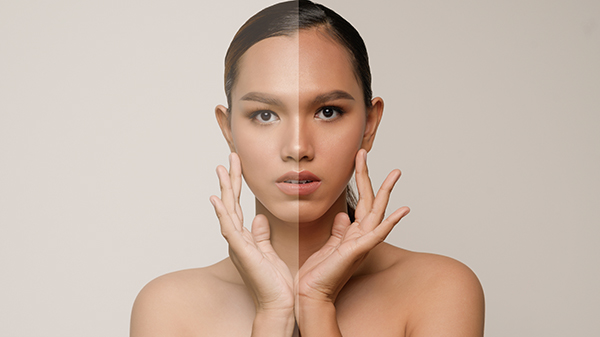It was fun at first – a golden glow, long lashes, smoother skin and a defined jawline – until it became more invasive. High cheekbones, bigger eyes, cuter pouts, slimmer faces, glass-like skin and doll-like perfection; so unreal, except the trend has never been more real. While projection of unattainable beauty standards is nothing new, photo-editing apps and filters powered by augmented reality have dramatically changed the way we choose to present ourselves to the online world.
Digitally ‘touching up’ our faces might seem like an innocent thing to do. A sudden breakout, lethargic eyes or visible greying spoiling your near-perfect selfie – why not run it through Meitu or Facetune it? But taken to extremes, it is harmful to self-esteem and well-being.
Imperfection is Passé
“The original selfie editor”, Facetune was launched in 2013 as a simple photo manipulating app that gives users the options to slim their faces, enhance features, cover grey, smooth blemishes, whiten teeth and eyes, and thus look at least 10 years younger. Alter your expressions to ‘fierce’ (squinted eyes), ‘cute’ (naughty smile) or ‘seduce’ (plump lips) with the touch of a button.
Facetune saw a 20-percent increase in users at the start of the pandemic and by January 2021, more than a million pictures were saved in its database every day. Along with similar applications, it can be downloaded by children as young as four. It has never been easier to smooth, shrink or shine your way to perfection. Your modified face can be saved and retrieved to admire or tinker with once more, over and over again.
Dr Keith Hariman, a psychiatrist at OT&P’s MindWorX Mental Wellness Clinic, feels that the message – your real face isn’t good enough – is a dark, damaging one, especially to someone already suffering from anxiety or struggling with a body-image disorder. “At face value swiping away your blemishes doesn’t seem like a terrible thing to do, but without doubt, the trend is a part of a bigger behavioural issue,” he says. “It creates a detrimental impact on the self-esteem and body images of people, especially young girls. The problem is not limited to correcting facial features, but encompasses other parts of the body like the bust, waist or bottom as well.”
Manipulation Mania
Spend a few hours scrolling through digitally manipulated images on Instagram – be it a friend’s edited holiday picture or a celebrity’s airbrushed gym selfie – and you are bound to feel worse about your own body.
Instagram introduced a selection of AR face-flattering filters for its Stories feature in 2018. Thousands of filters are now commonly used by millions of people to appear cosmetically enhanced. Many of these appear harmless as brightening and colour-correcting tools, but in reality they alter your facial features and expressions more than you realise.
Edited imagery and its impact on self-worth is nothing new, yet the earlier trend of airbrushed magazine images of celebrities was about measuring yourself to unrealistic beauty standards. Now with filters, it’s a whole new level – it’s about comparing your real self against your fake, tweaked image.
“Now with filters, it’s a whole new level – it’s about comparing your real self against your fake, tweaked image”
Divorced from Reality
If we were filtering our lives before Covid-19, the trend spiralled out of control in 2020. As our social world became entirely digital and screen time shot up, staring at our own faces, day in and day out on Zoom, Google Hangouts or Houseparty with a ‘touch up’ button has left a dramatic, precarious impact on our self-image and mental health.
The regularity of using filters is particularly disturbing – whether those clearly designed to refine ourselves or the silly ones that just change our appearance. Self-esteem issues may be directly linked to the discrepancy between our touched-up selfies and how we actually look in the mirror. Positive validation with ‘likes’ and ‘comments’ is like a rush of dopamine that makes you repeat the behaviour again and again, creating a troubling online environment that is increasingly divorced from reality.
End of Individuality?
In 2019, plastic surgeons the world over coined terms like ‘Snapchat Dysmorphia’ and ‘Instagram Face’ to describe the trail of aesthetic sameness that filters and photo-editing apps leave in their wake.
The world of social media is so visual that cosmetologists are becoming deluged with people seeking an upgrade to look more like their enhanced image rather a celebrity. But with everyone singing to the same (face)tune, a whole generation is trying to fit into an identical beauty mould – big eyes, bigger lips, perfect round buttocks, pore-less skin, the waspiest of waists… This not only deletes individuality, but spurs the current uncanny resemblance of young women to porcelain dolls.
If filtered images are leaving you with low mood, anxiety or body image issues, what’s the solution? Selfies and the appearance-obsessed culture aren’t going away. Perhaps then, a robust regulation to flag each image as doctored might be the way forward.
“With everyone singing to the same (face)tune, a whole generation is trying hard to fit into an identical beauty mould”
But until that distant moment, protect your mental health. Exist in the real world and limit screen time – and if you find yourself crushing under the weight of unrealistic social standards, seek professional help without delay.







